Hostel Cooking Tips for Solo Travelers
If you are new to hostel cooking (or cooking in general) and are a solo traveler, you might feel a little intimidated by a bustling communal hostel kitchen at meal times. I know the feeling, and I’m an experienced cook!
Despite my experience cooking for one, hostel cooking during my travels in New Zealand was still challenging. Poorly stocked and overcrowded kitchens made it difficult (or nearly impossible) to prepare cheap healthy meals. Sometimes, I’d opt for takeaway meals or a very rare sit-down meal, but working through the chaos and cooking for myself more often allowed me to experience more of the country with the money I saved.
To make it a little easier for you, here are all my tips for cooking at hostels while traveling solo.

Hostel Cooking for Solo Travelers
Some of these tips may seem like common sense to some. Or maybe you’re someone who has never cooked a meal solo before and has no idea where to start! The more hostels you stay at while traveling, the more you will see the VERY WIDE range of amenities offered in the communal kitchens.
Prepare your meals before or after peak hours. Avoid the crowds altogether and plan your meals just before or after the regular meal-time rush.
Make simple meals. You don’t need to make elaborate meals, but you don’t have to eat pasta and jarred tomato sauce every night either.
Eat breakfast for dinner (and lunch). It’s one of the easiest meals to make any time of day, and so satisfying.
Cook one-pan meals. One-pan might be all that’s available in a busy hostel kitchen! Make the best use of it.
Embellish pre-packaged meals like ramen or canned soup by adding extra veggies, leftover rice, pasta, or meat, and extra seasonings. See the bowl of ramen pictured above that I filled up with fresh veggies.
Don’t follow recipes! Get creative and resourceful with your meals. You never know what you’ll come up with.
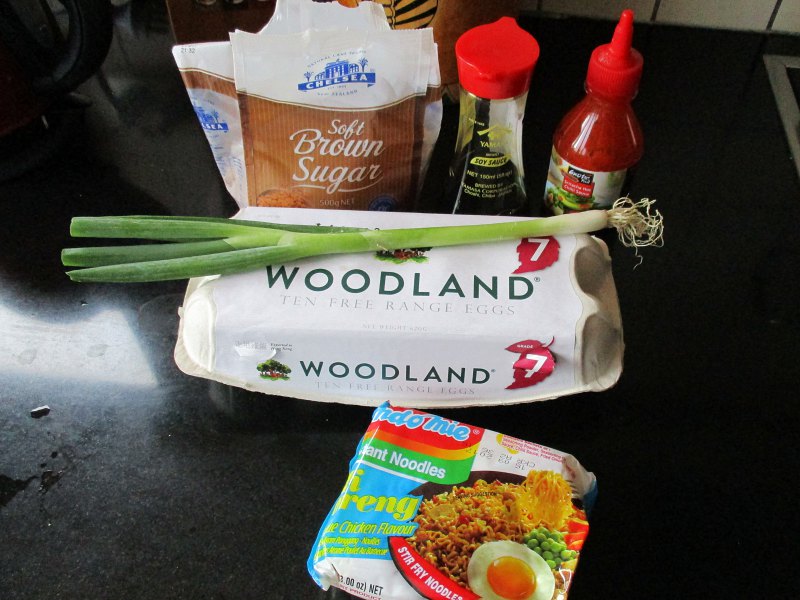
Use Versatile Ingredients
The key to hostel cooking is to base your meals on versatile ingredients like rice, eggs, potatoes, and pasta. These staple items are the base of so many types of dishes. Add fresh and local produce, meat (like rotisserie chicken – whole or pieces), herbs, and spices to create different dishes of all types.


How to Shop for Food as a Solo Traveler
Shop in the right places. Ask the grocery store butcher for individual servings and smaller portions of meat. Buy single items at the grocery store bakery. Instead of buying a whole jar/container of certain ingredients, get exactly the amount you need at the salad/olive bar if the grocery store has one. Shop bulk bins to get the perfect amount for one person.
Think outside the grocery store. Shop at farmers’ markets for local produce that will be in season and cheaper. Specialty and discount stores sometimes have food sections where you can find a good deal.
Avoid most convenience stores unless it’s an emergency. Otherwise, food products are outrageously marked up.
Shop frequently, only buy what you need, and will definitely eat before you leave the hostel.
Check the hostel kitchen before you go to the store. Look for a community shelf or bin where guests leave ingredients they no longer need. Some hostels provide cooking oil and a few spices for guests to use, too.
Money-Saving Tips
Buy store brand items instead of name brand. The same goes for local brands over recognizable American brands when you’re overseas.
Refill your own stash along the way. Buy a small plastic bottle of salad dressing or oil. Once it is used up, refill the bottle with oil left behind by other travelers. Or use a clean reusable travel-size toiletry bottle with a tight fitting lid – no screw tops – they leak!
Buy discounted food at grocery stores. Most grocery stores sell day-old baked goods from their bakery for a 50% or more discount.
Avoid recipes that use rare ingredients. These could be expensive or only available in larger quantities than you need.

Helpful Items for Hostel Cooking
Having these things helped me exponentially while traveling long-term in New Zealand!
These things are cheap and available everywhere, and I promise they will make hostel cooking easier. You can pick them up once you arrive at your destination and then leave them all behind when you plan to return home. I’m sure other travelers will appreciate finding the following items in a leftover/shared bin.
Reusable + Collapsible Grocery Bag
Be a responsible traveler and skip single-use plastic bags! One or two reusable bags will keep all your food wrangled in the overcrowded hostel refrigerators and shelves. Plus, you can get a colorful bag that stands out and makes your stuff easy to find in the sea of white plastic grocery bags that everyone else uses.
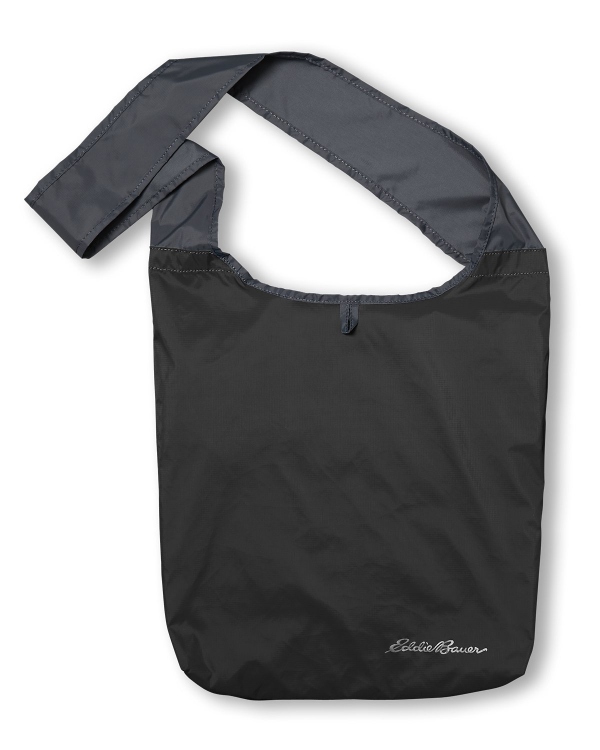
Ziploc Bags or Stasher Bags
Before I got a set of Stasher Bags, I used Ziploc bags for all sorts of things during most trips I’ve taken. I washed and reused the same few bags over the course of the 3 months I spent in NZ.
You can store foods that spill easily, like coffee grounds or sugar. Ditch bulky boxes, pill bottles, or heavy glass jars (like peanut butter jars) and store the contents in a bag instead. They are also useful for packing snacks for long days of sightseeing.
Compress them by squeezing all the air out, then stuff them into the tiny crevices inside your luggage.
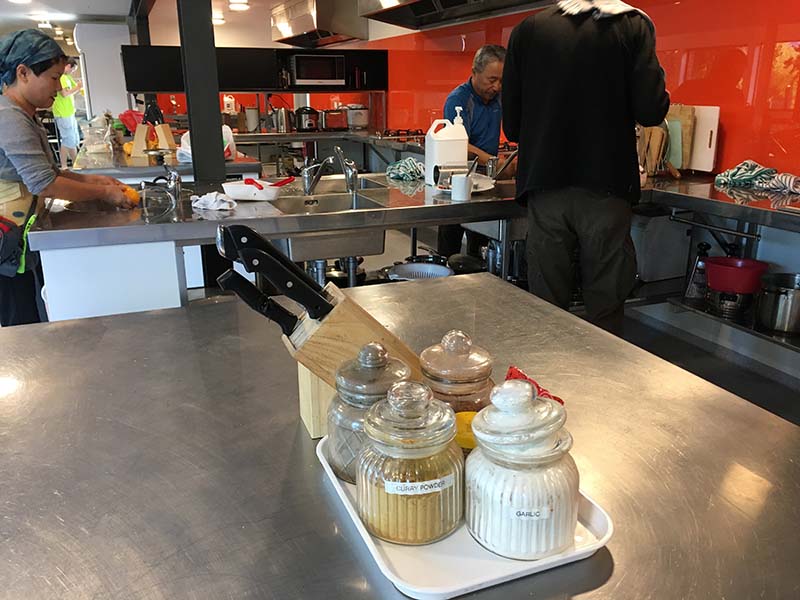
Spices
Spices are the best cooking tool you can carry. Some hostels will have a bin or shelf with spices or oil left behind by guests, but consider yourself lucky if you find what you actually need.
Grocery stores are beginning to sell spices in smaller portions or in easy-to-pack and carry bags. I found all the spices I needed in New Zealand packaged in small boxes that sold for $1-$2 each.
If you can’t find spices packaged this way, you could buy bottles of whatever you need and transfer them to smaller spice containers or small Ziploc bags to ditch the weight.
Helpful and versatile spices to carry include salt, ground pepper, and garlic powder at a minimum. Add cinnamon, cumin, cayenne pepper, crushed red pepper, and paprika to add even more variety, plus any of your personal favorites.
Sponge
I did not carry my own sponge around NZ, but I frequently moaned and groaned to myself about the poor condition of hostel sponges. Most sponges were cheap, old, and smelly, and the dish soap was often watered down. A guest writer (who has OCD and experiences anxiety in hostel kitchens) carries a silicone sponge with her. So smart!
Even more helpful items to have while staying in hostels.
SAVE THIS POST FOR LATER!
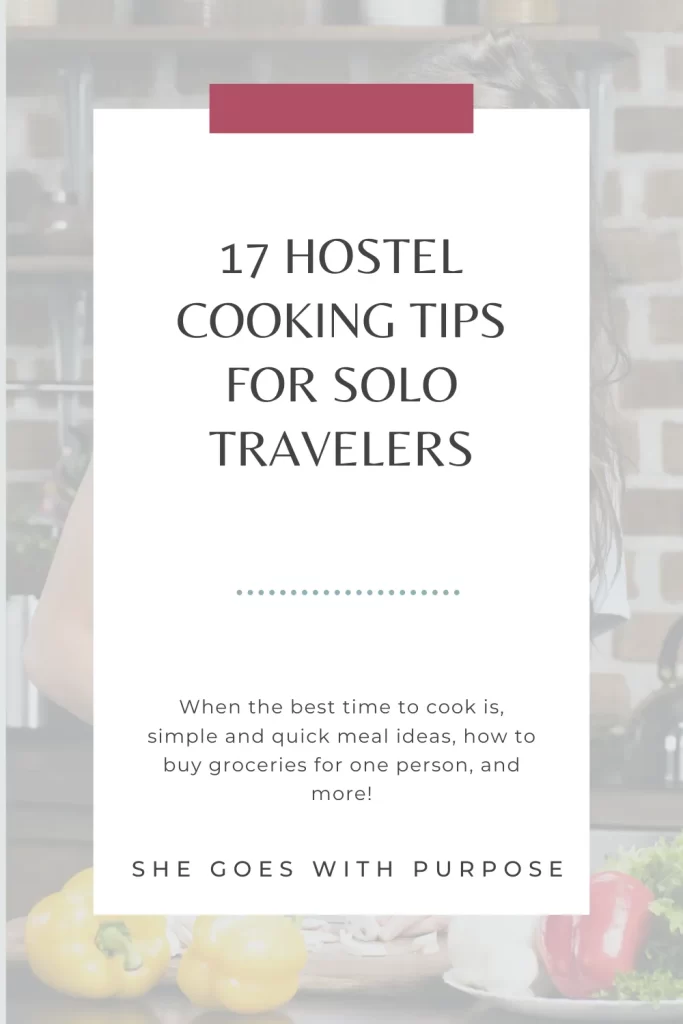
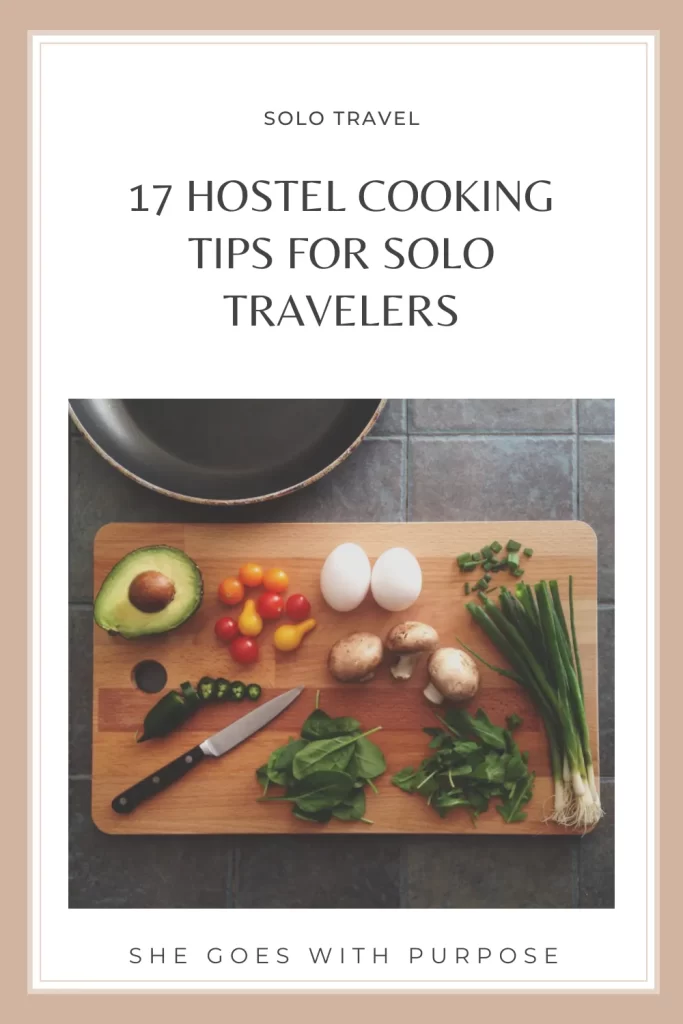
Amazing tips! It’s nice to see a distillation of all of the things you have to think about – cooking for one AND cooking in a shared environment AND cooking with unfamiliar equipment. I’m itching to find a place that sells spices in bulk near me. So much easier having a little plastic packet of a couple of tablespoons of spice vs having to buy the whole jar. Thanks for the ideas!
Thanks, Kat! I’m glad you found it helpful! If there’s a “health food” store or a co-op near you, they might have spices in bulk.
Some fantastic tips here – I will be using them myself at home to cook for hubs and I really great ideas I love the ramen idea I have been making them up for lunch for a few years now and you can get so creative with leftovers they are delish.
They are so versatile and cheap! Thanks for reading, Faith.